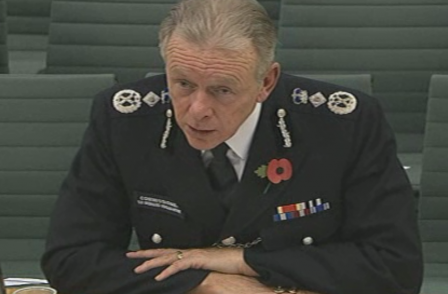
The Commissioner of the Metropolitan Police has told MPs he is open to the idea that police access to journalists' phone records should be subject to judicial approval.
Appearing before the Home Affairs Select Committee, Bernard Hogan-Howe also claimed the Met does not “routinely” collect information on journalists and look at sources.
This is despite the fact it emerged today that the force has more than 2,000 records relating to journalists on an anti-extremist database. Elsewhere, the Met is known to have accessed the phone records of The Sun as part of its investigation into the Plebgate scandal and conducted 38 press leak investigations in the five years to the Leveson Inquiry.
“We’re concerned about the thought that any journalist and their confidential sources are being the subject of a investigation or being contained in the files of the Met,” committee chair Keith Vaz MP said.
“You can assure this committee, can’t you, that you don’t routinely collect information on journalists, and look at their sources?”
Hogan-Howe responded: “We don’t. I mean, the only reason that we have an interest in anyone is that we consider them to be suspicious about the involvement in in crime.
“So that’s the main reason that we have an interest in people, either as a victim or as a suspect.”
He was asked later in his 45-minute appearance by Liberal Democrat Julian Huppert about proposals under the Data Retention and Investigatory Powers Act to give protection to journalistic material
Huppert asked him if he would be “comfortable” with journalists being exempt from having their communications collected.
The commissioner said: “Entirely? I would say no, I would argue no.
“I mean, the starting point for me would be, given the current debate with journalists and RIPA, is that first of all I think we’d all agree that if a criminal is involved in criminal activity then we expect to be able to investigate them. And no matter who you are, and what you are, that should be the case.”
On privileged material, he added: ”It seems to me that when the individual is exercising that privilege then they deserve at least some consideration and probably some protection provided that privilege is not being abused.”
The Met Police currently has to go to the Home Secretary to intercept the content of communications, but internal approval is used as a justification for obtaining communications data – i.e. call records.
On the gathering of communications data, Hogan-Howe said: “I think it’s certainly possible you could argue that there are various forms of trips that should be passed.
“Now the ones we have at the moment are senior police officers. Now it sounds as though people aren’t that reassured at the moment about that. I understand that, so there are various options.
“It could be more senior police officers but that might not be too reassuring. You could think about interception commissioners. You already have some pre-authorisation in some cases from surveillance or from interception. Or you could argue for judges.”
Asked by Huppert if he’d be relaxed about this, Hogan-Howe said: “I think you have to,” though he added that it can be difficult to define a journalist.
Later, committee chair Vaz asked Hogan-Howe about “guidance from ACPO to local police forces including your own asking them to use national security excuses to refuse freedom of information requests from the Press Gazette”.
The commissioner said: “From what I’ve seen of that exchange I think it’s a genuine response to section 19. IS that under intercept, we have a duty not to reveal this information rather than to reveal it in terms of where the warrants are and who they’re against.”
Email pged@pressgazette.co.uk to point out mistakes, provide story tips or send in a letter for publication on our "Letters Page" blog
